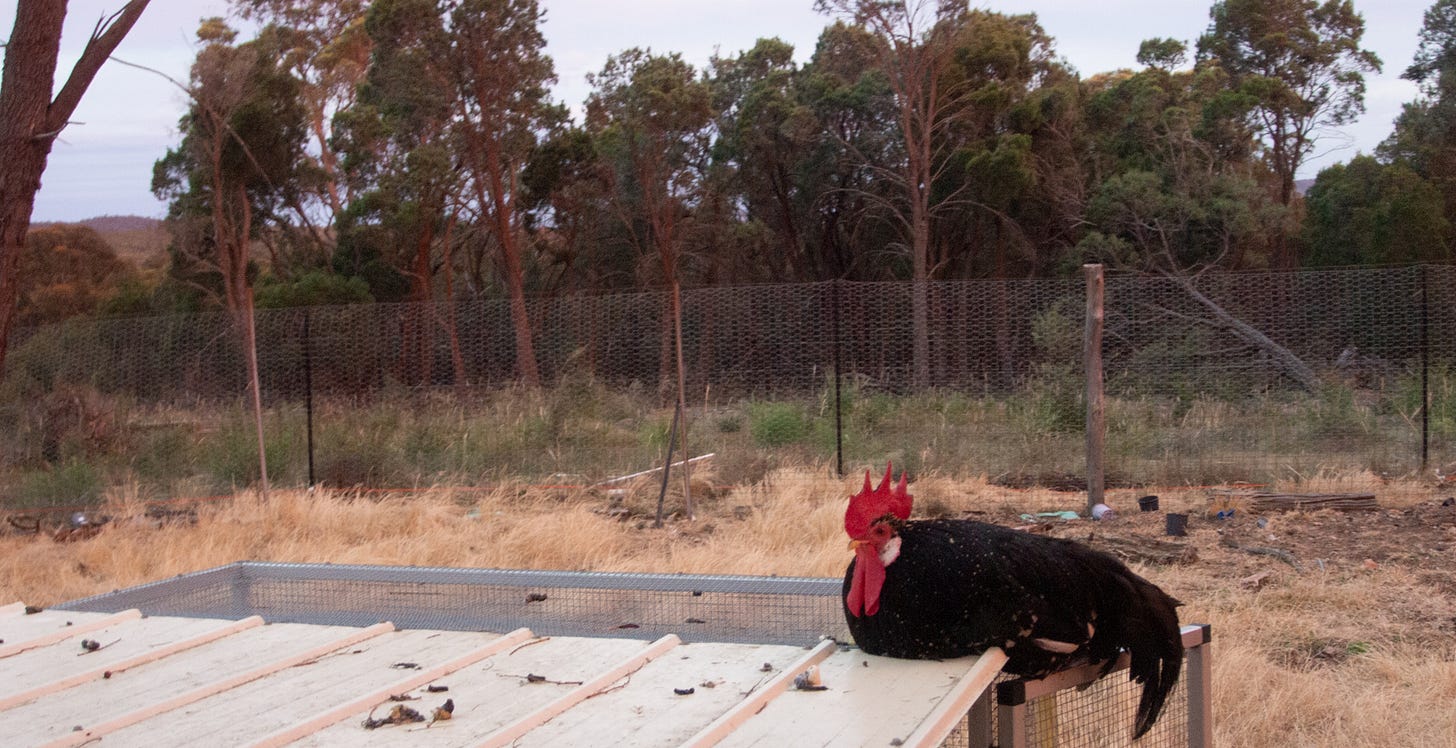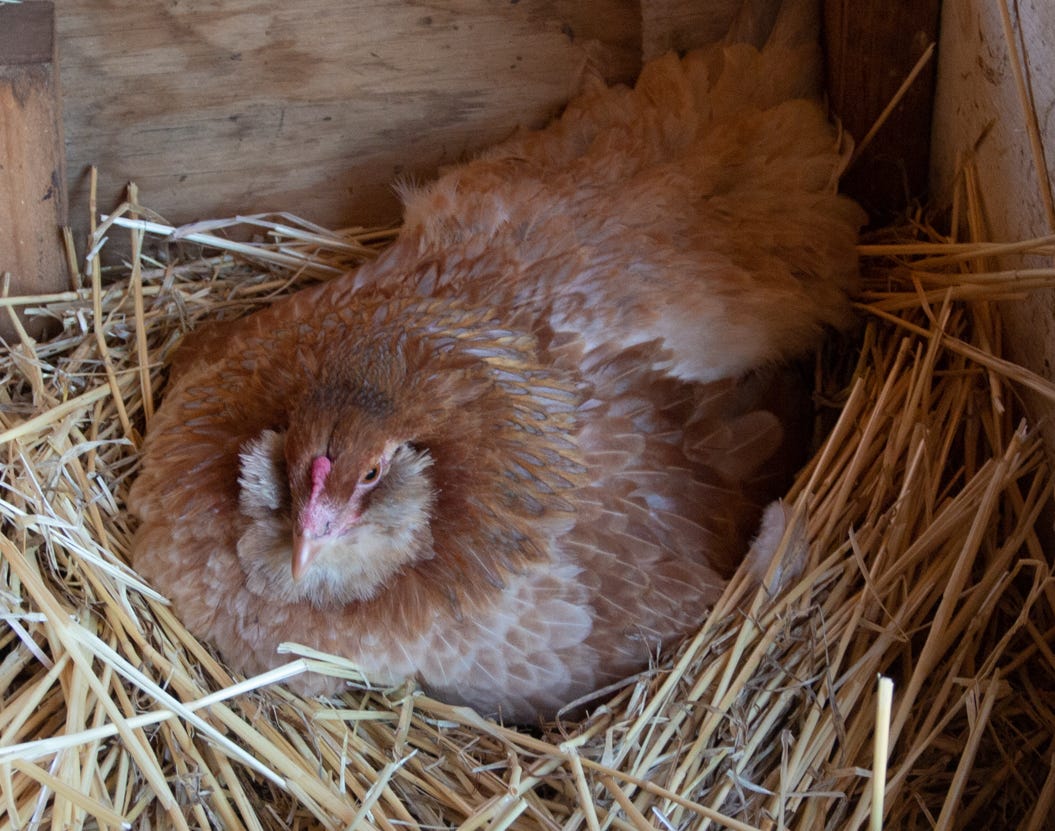
When discussing the emotive part of this topic, I use "mercy" quite deliberately, instead of "humane euthanasia" or “dispatch”.
Because quickly and humanely ending the suffering of a living thing is a mercy to that living thing, even though it rips my heart out of my chest.
My pain is how I care; but easing my pain at the animal's expense is just selfishness.
So ... "mercy".
This article provides some things to look for, to decide what action you might need to take next.
Introduction
Farmers often learn the saying: “If you have livestock, you have dead stock”. They will nurse a sick animal if there is a good chance of survival, but would rather put it down if it's not improving rather than prolonging any suffering.
Backyard poultry owners, however, regard their poultry as pets.
And as a society, we tend to be be hesitant to end the life of a pet because we have been conditioned to be fearful of what happens after death, and how those we leave behind will manage without us. We have also been raised to be caring and to not inflict harm - and on the whole, we’re taught that death is harmful and, to a certain extent, even avoidable.
Animals don't have that innate fear of death. They may have a fear of danger, but don’t fear death in and of itself.
So at some point, your birds will come to the end of their life - and chooks have relatively short lives.
Commercial brown layers tend to live 2-4 years. Their egg-a-day habit shortens their lives.
Purebreeds, or backyard/farmyard crosses, tend to live 6-8 years. Their tendency to stop laying over winter, when brooding, or when the weather looks at them crossways :) extends their lives.
Obviously there are individual exceptions. These are tendencies over the population.
Some will be found dead one day. This is the easiest option on us humans. They have clearly died fairly fast, and hopefully painlessly.
But some will be found unhealthy or unhappy. Obviously we do all we can to fix or cure them, but there will come a time when it's clear there's nothing more to be done.
The decision then comes whether to let them die on their own, or to provide "mercy" - a fast, humane death.
This is a hideous decision, and one that anyone with animals is faced with at some time in their lives.
How to decide?
I make the decision based on my determination of their suffering.
First of all, if you see an unwell chook, they are very unwell; well down the road to death.
Chooks hide illness until it can't be hidden any more, because a sick bird in the wild is automatically prey.
A suffering, potentially dying bird:
Has their head tucked into their body.
Has a hunched or crouched appearance.
May have a wide-eyed tense look (some may say "alert", but there's a difference between "happily alert" and "wide-eyed and in pain").
If eyes are closed, have some tension around the eyes.
May be twitchy or moving around.
May eat desperately or savagely (could be mistaken for "eating well") - using the normally-happy pecking action to try and make themselves feel better.
May have their head tucked right back into the body and beak pointed a bit into the air in a "gasping" look (depending on the problem).
Has overt issues such as droppings caked under the tail, open wounds, or clear difficulties in breathing.

A dying but non-suffering bird:
Tends to look like an ordinary sleepy bird.
May look like a broody bird - sort of spread out and relaxed.
Eyes may be closed, head and beak nodding toward the neck and falling forward.
Is probably disinterested in food or water.
Doesn't move around much at all.
Looks more or less ok - no caked droppings, no open wounds, no gasping for breath
Has relatively normal, quiet breathing

It's very difficult to explain all the differences, but it basically comes down, in my eyes, to the relative relaxation state of the bird.
Leaving alone vs dispatch
A bird that's sleeping quietly is one to whom I provide palliative care. I'll keep her with her flock, moving her around from sun to shade to coop at night. I will often find the bird dead one morning, still in the same "sleeping" pose I saw her in the night before. That's a bird that has peacefully and painlessly gone to sleep, warm and content and with her flock.
A bird that is clearly tense and in pain, I'll dispatch. We process our own cockerels, so we know how to dispatch a bird quickly and painlessly. Before we learnt, however, we took them to the vet for humane euthanasia.
When?
There's a saying in animal care. "Better a week too early than a day too late".
There is no point keeping a bird alive against a potential miraculous recovery. Chooks don't understand the future in that way. Humans do, so humans can be given hope to hold against present suffering and treatment.
We can't communicate hope to chooks. So all they know is that they're in immense discomfort or even pain right here and right now. They start shutting down against that pain - see the lists above.
Yes, you'll hear stories of recoveries; but at what cost? In all conscience, should we allow our animals to go through suffering on the off chance that so we might feel better a week or two later?
By all means, try to diagnose and treat the issues. A chook gasping for breath with a respiratory infection will respond to antibiotics, and feel better in a few days.
But if there's no response to treatment within 1-2 weeks, then we need to consider that the bird cannot be treated and will not get better.
Accepting and acting on that is one of the bravest, most human things we can do for our animals.
How?
It must be a method that results in rapid death, or rapid loss of consciousness followed by death while unconscious - the legal definition of “humane” in Australia. Speed is imperative, not the perceived ease of use by the supplier of mercy.
In practical terms, this means a vet visit (may not be possible due to time, distance, or cost), or methods requiring a certain skill including decapitation, cervical dislocation, or suitable blunt force to the head.
Knowing these are the only options may well be one reason why people delay providing mercy.
These are covered in much more detail in a separate article.
So ... mercy
I use "mercy" quite deliberately, instead of "humane euthanasia". Because quickly and humanely ending the suffering of a living thing is a mercy to that living thing, even though it rips MY heart out of my chest.
My pain is how I care; but easing MY pain at the animal's expense is just selfishness.
So ... "mercy".
Got thoughts on this difficult topic? A story of your long-lived birds? Join in the conversation!




